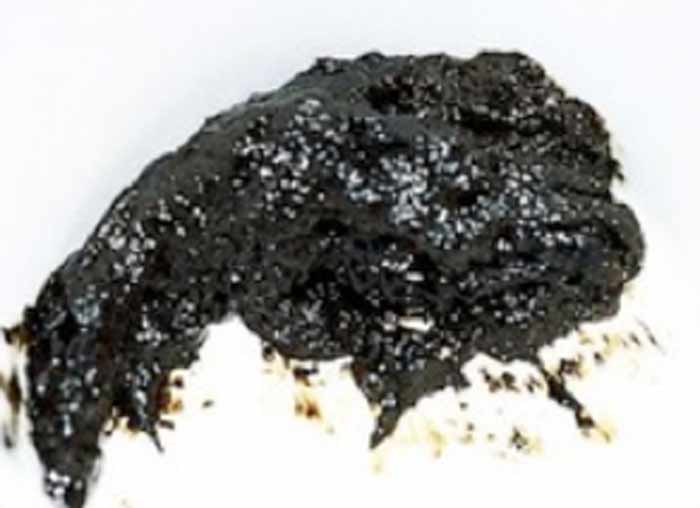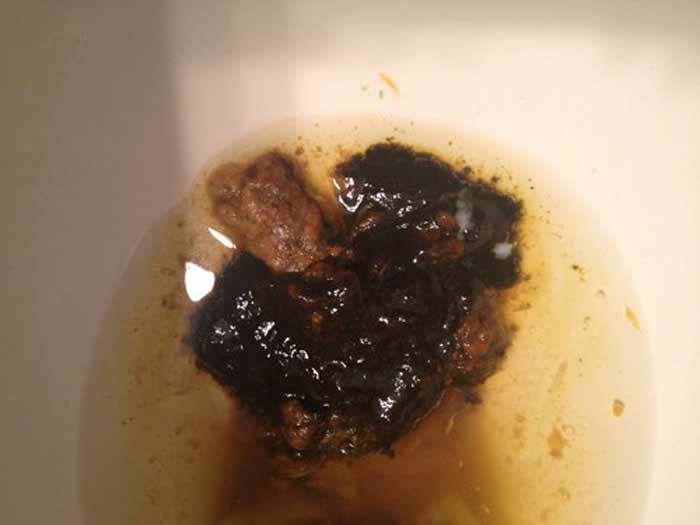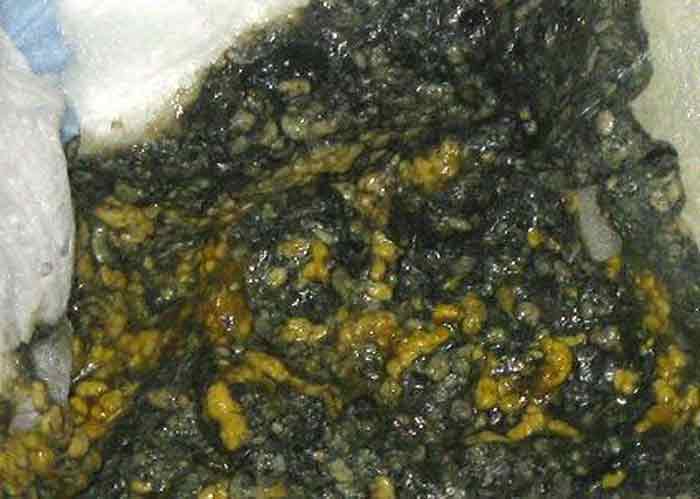Wondering what your black tarry stool is all about? Here is a breakdown of what it means, what it looks like, causes in both adults and kids, what indicates if it is bloody, brownish or greenish and what to do about it.
Black Tarry Stool, Definition, Meaning & Medical Term
What is Tarry Stool?
Tarry stool is stool that is black or dark red in color. It is an indicator of injuries in your gastrointestinal tract or bleeding.
What does it mean when it is Dark or Black
There are several reasons as to why you have black stool. They include;
Color of the food
One of the most obvious reasons why you have black or dark stool is because you probably ate black colored food. At such a time, you need not to worry since it is not a sign of a serious condition.
Esophagus or stomach irritation
Most times, issues to do with your stool are associated with problems in the digestive system. Ulcers for instance irritate the stomach. In most cases, ulcers come hand in hand with gastritis which results to bleeding.
When mixed with the digestive fluids, the blood turns into a black substance. That therefore explains why your stool will in the end be black.
Medications
If you are under medication and your stool appears black, you may actually blame the color change to the drugs you are taking. For instance, bismuth-based medications and iron supplements darken your stool.
Blood and circulation abnormalities
Sometimes, when you experience severe blood and circulation abnormalities in your body, you may excrete black stool. Such abnormalities include; bowel ischemia which is a decrease in amount of blood that goes to the intestines.
You may also have misshapen which refers to vascular malformation. Another possible abnormality is if your varices are large. In such a case, you will have protruding veins. [1]
Black stool as a symptom of other conditions
Sometimes, black stool comes as a symptom of an underlying condition. Below are some of the conditions that may have black stool as a symptom;
Stomach ulcers; as already discussed, stomach ulcers lead to bloody stool. When you report black tarry stool, your doctor runs tests to find out if by any chance; stomach ulcers are responsible for the black stool.
Bleeding esophageal varices; this condition is considered an emergency and once you are diagnosed with it, you will need immediate treatment. Among the known symptoms of this condition is black stool.
Peptic ulcer; these are painful sores in your stomach lining. When they are at their worst, these ulcers may result to bleeding. It is this bleeding that after mixing with your body fluids forms black stool.
Necrotizing Enterocolitis; this is a condition in which there is a damage of the intestinal tissues. When you realize that you have black stool, it may just be a symptom of destruction of your intestinal tissue.
Colonic polyps; these are growths on your colon. These growths highly interfere with the manner in which absorption takes place. Among the symptoms of this condition is black stool.
Intussusception; this condition refers to folding of part of the intestine inside another part. This causes blockage of the intestine. Black stool is taken as an indicator of intussusception.
Black tarry stool is called… (Medical Term)
The medical term used to refer to black stool is melena. Its origin is a Greek word ‘Melas’ meaning black. Melena is actually a symptom rather than a disease.
Pictures -What does Tarry Stool look like
Tarry stool appears as dark or black stool. It usually has a foul smell. Tarry stool does not have a distinct shape. It appears as a shapeless blob which has a dark color. Pictures of tarry stool will help you determine if at all your stool should be examined for any underlying conditions.
Pictures/Images
What Causes Tarry looking Stool in Adults
There are many causes of black tarry stool. The causes range from those you need not to worry about to some serious underlying conditions. Either way, the black color of the stool can be done away with through the necessary treatment. Discussed below are the most common causes;
Pepto bismol and black tarry stools
Some medicines lead to black stool. One of such medicines is pepto bismol. The discoloration by this medicine is usually temporary. The active ingredient in pepto bismol has bismuth, which is responsible for the black color of stool. When bismuth mixes with sulfur traces in your gastrointestinal tract and in your saliva; a black substance forms.
The black substance formed is bismuth sulfide. It is this substance that gives your stool the black color. The stool discoloration may last for some days after you stop taking pepto bismol. How long the black substance will take to be eliminated from your body depends on how much of the medicine you had taken. Some factors like age and personal bowel behavior may also influence the duration taken.[2]
Black tarry stools and iron supplements
Iron supplements customarily affect stool. In terms of color change, iron supplements cause your stool to darken. Most people report that their stool turned black after using iron supplements. The University of Maryland Medical Center confirms that, a darkened stool color is one the expected side effects after ingestion of iron.
The Medical Center further explains that; if your stool does not change in color after taking iron, it is a sign that the iron has not been effectively absorbed into your system. This is common with tablets that are coated and intended to be used for long periods. If you are on a short term use of iron yet your stool color does not change, you are asked to request for a change of brand from your pharmacist. [3]
Tarry stool after drinking
You may notice that your stool appears black after drinking. If you are a heavy drinker of alcohol, you will most likely experience the stool color. Alcohol triggers gastritis and you may have bleeding on your stomach walls. When too much acid is released in your stomach, it mixes with blood and it is this that results to the black stool.
Clearly, there is no direct link between alcohol and black tarry stool. It is only after alcohol triggers release of your stomach acids that you stand a chance of having black stool. It is therefore not always the case that your stool turns black after alcohol. [4]
Stomach pain
Whatever happens in your stomach contributes greatly to the color of your stool. Stomach pain can be as a result of stomach ulcers, gastritis or even stomach cancer. Most of these stomach conditions result to release of too much acid in the stomach as well as bleeding in the stomach walls.
As explained earlier, a mixture of digestive fluids in the stomach and the blood give your stool a black color. Whenever you have stomach pain and your stool turns black, you may have a serious underlying condition and you will need to undergo certain tests.
What does it indicate if tarry stool is;
Bloody
If your stool appears bloody, you may need to see a doctor so that the underlying condition is determined. To begin with, the bloody stool could be a result of the lower part of your digestive system bleeding. Benign polps or cancer on your colon may cause gastrointestinal bleeding.
Apart from that, diseases affecting the bowel, such as bowel inflammatory diseases, are also a likely cause of bloody stool. Diverticulosis, Crohn’s disease and ulcerative colitis are examples of such bowel diseases.
Moreover, hemorrhoids are also an identified cause of bloody stool. Hemorrhoids occur when the veins around the rectal area are swollen. When you strain to make bowel movements, you may end up with bloody stool.
Brown in color
In most cases, the normal stool color is brown. Bilirubin, which is present in bile, is responsible for the brown color of the stool. The concentration of bilirubin explains the changes in how dark the brown color in your stool is. Sometimes, your stool is light yellow while it could also be too concentrated and hence it appears dark.
The yellow color of the stool is also a sign that your stool is dilute and the levels of bilirubin produced from the liver are very low. It is clear then that the only time you should not question your digestion is if your stool is consistently brown. A black or green color of the stool may need you to dig deep into your system.
Green in color
When the food you eat passes through the intestine too fast, there is no sufficient time for bile to be digested. As a result, the bile does not have ample time to give brown color to the stool. In normal cases, bile is changed chemically by bacteria in your system to a green-brown color.
It takes quite some time for the bile to be changed from its green color to the brown color of the stool. When a person has a running stomach, for example, there is never sufficient transition time. That explains the likelihood of your stool being green when you have diarrhea.
Green stool may come about when your diet has too much green food. For instance, when you eat too many green vegetables, the probability that your stool will be green is very high. This indicates that having green stool is sometimes no cause of alarm. [5]
What to do
When you realize your stool is black, you do not need to panic. There are several treatment options that are at your disposal. The most important thing is to first determine the cause of the black stool. You are advised to visit your doctor who then carries out a medical examination to establish why exactly your stool is black.
Among the available treatment options for black stool is use of antibiotics. Your doctor may also give you acid-reducing drugs. This is applicable in the case where too much acid in your stomach or a case of gastritis is why your stool is black. Your doctor may also ask you to avoid foods that raise your acid levels.
Apart from that, you may undergo surgery in attempt to remove abnormal veins. As already mentioned earlier, one of the main reasons you have black stool is if the veins around your anal area are abnormal. Removal of such veins makes it easy for you to have normal bowel movements.
If your black stool is as a result of your diet, you may need to adjust it. For instance, you may need to neutralize the color of the foods you consume. That aside, it is highly recommended that you eat foods that are have high fiber content. This makes digestion easier preventing any possible colon tears as well as reducing stress when making bowel movements.
In summary, your doctor will treat you depending on what exactly caused the black stool. It may be quite difficult to rely on home remedies to treat black stool. This is because; it is difficult to determine the underlying conditions on your own. Always consult your doctor first.
Sources
[1] https://www.healthline.com/symptom/black-stools
[2] https://www.pepto-bismol.com/en-us/faq/black-stool-black-tongue
[3] https://www.livestrong.com/amp/article/275693-does-taking-iron-supplements-turn-your-stool-black
[4] https://www.healthtap.com/topics/black-stool-after-drinking
[5]https://www.medicinenet.com/stool_color_changes/article.htm#stool_color_texture_and_form_changes_facts







